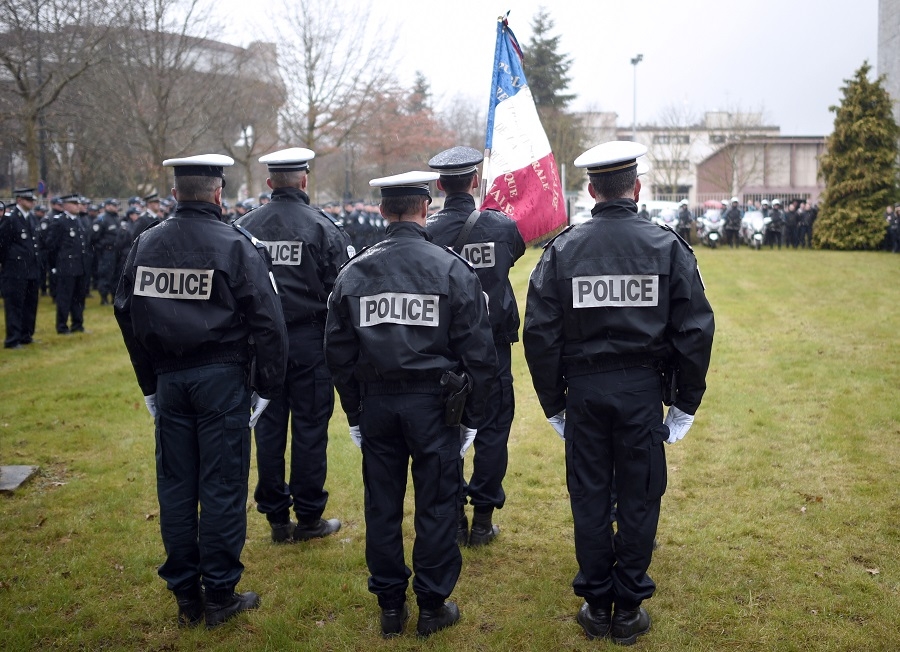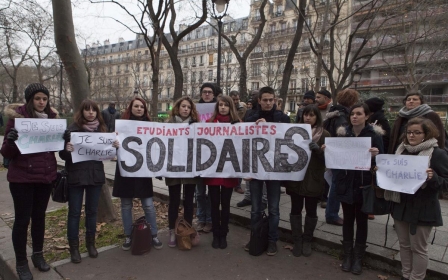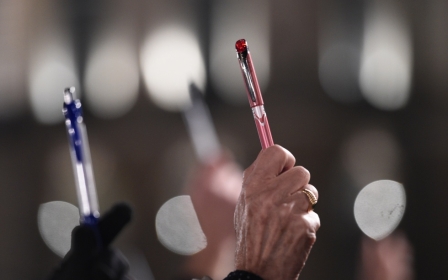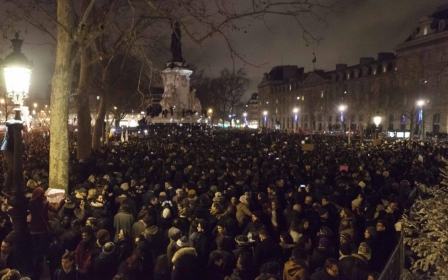Police manhunt closes in on Charlie Hebdo attackers

PARIS - Two “armed and dangerous” brothers suspected of carrying out the Charlie Hebdo magazine killings in Paris were on Thursday thought to be holed up in northern France.
Armed police swamped an area of countryside in the Aisne department, where Cherif and Said Kouachi were said to have robbed a petrol station close to the town of Villers-Cotteret.
Two men matching their description were seen in a Renault Clio with covered number plates at around 10.30am.
They were said to be wearing balaclavas, and guns were visible in the back of the car, according to eyewitnesses.
An investigating source said the garage manager had “recognised the two men as those suspected of taking part in the Charlie Hebdo atrocity.”
Another source said: “The two men were masked, with Kalashnikovs and rocket launchers showing.”
France is holding a day of mourning for the 12 people killed by automatic gunfire during the country’s worst terrorist atrocity this century.
A woman police officer was shot dead on Thursday by a gunman in a Paris suburb in what police fear may have been a copycat attack.
As the manhunt for the Kouachi brothers continued, their alleged getaway driver Hamyd Mourad, 18, turned himself into police in Charleville-Mezieres in northern France.
All three French-Algerian Muslims escaped on Wednesday following the bloodbath at the offices of the notoriously anti-Islamic satirical magazine in Paris.
Questions were being asked as to why – once again – young Frenchmen with close links to fundamentalist Islam and its terrorist affiliates were apparently given free rein to carry out their crimes.
The fact that two were still at large more than 24 hours after a gun battle in which two policemen died alongside ten others, mainly magazine staff, was also a cause for huge concern.
Detectives identified the suspects after one left his identification papers in the abandoned Citroen car used to escape after the attack on Charlie Hebdo in the 11th arrondissement of Paris.
A French police source said Mourad, a student, was encouraged to hand himself in by relatives after his name appeared on social media as a suspect for the killings. He was under armed guard on Thursday and being questioned by police.
Operations by RAID, the police tactical unit, at an address in Reims, eastern France, led to four further arrests, and there were three more arrests in other parts of the country, said the source.
Both of the two main suspects Said Kouachi, 34, and his brother, Cherif Kouachi, 33, were first arrested in 2005 in their alleged members of the Buttes Chaumont – a group operating out of the 19th arrondissement of Paris which was sending fighters to Iraq.
Cherif was convicted in 2008 and jailed for three years, with 18 months suspended, for his association with the underground organisation.
He had wanted to fly to Iraq via Syria, and was found with a manual for a Kalashnikov – the automatic weapon used in Wednesday’s attack.
Said was freed after questioning by police, but – like his brother – was known to have been radicalised after the Iraq war of 2003, when Anglo-American forces deposed Iraq’s former President Saddam Hussein.
Both brothers were said to be infuriated by the killing of Muslims by western soldiers and warplanes.
Vincent Olliviers, Cherif’s lawyer at the time, described him as initially being an “apprentice loser - a delivery boy in a cap who smoked hashish and delivered pizzas to buy his drugs”.
But Ollivier said the “clueless kid who did not know what to do with his life met people who gave him the feeling of being important”.
After his short prison sentence, Cherif was in 2010 linked with a plot to free Smain Ait Ali Belkacem, the mastermind of the 1995 bombing of the St Michel metro station in Paris that killed eight people and wounded more than 100 others.
Belkacem was a leading member of the GIA, or Armed Islamic Group – an Algerian terrorist outfit responsible for numerous atrocities in the 1990s.
The Kouachi brothers, who are orphans, are believed to have been introduced to al-Qaeda-style beliefs by an Imam operating in northern Paris.
According to French media, they were raised in foster care in Rennes, in western France, with Cherif training as a fitness instructor before moving to Paris.
In the capital, they lived in the 19th arrondissement where they became associated with Farid Benyettou, a janitor-turned-preacher who gave sermons calling for jihad in Iraq and suicide bombings.
Benyettou’s Buttes-Chaumont recruitment group, named after a Paris park, sent at least a dozen young men to fight in Iraq.
The Kouachis share similar backgrounds to Mohammed Merah, the 23-year-old French Algerian responsible for murdering seven people, including four Jews and three Muslim soldiers, in the Toulouse area in 2012.
Merah, who was himself shot dead by police, had also been left to operate in France, despite the authorities knowing he had trained with al-Qaeda in Afghanistan.
Last year, Mehdi Nemmouche, a 29-year-old French Algerian, was arrested in Marseille in connection with an attack on the Jewish Museum in Brussels which left four people dead. He denies any crimes and is currently on remand in Belgium.
Nemmouche had also been able to travel to and from France to Syria, where he is known to have fought with Islamic State.
France remains on the highest terror alert and extra troops have been deployed to guard media offices, places of worship, transport hubs and other sensitive areas.
Vigils have also been held in Paris and in cities across the world in tribute to those killed in Wednesday’s attack.
Many carried placards reading “Je suis Charlie” (I am Charlie) in solidarity with the victims.
Eight journalists - including the magazine’s editor – died along with the two policemen, a maintenance worker and another visitor when the masked terrorists stormed the Charlie Hebdo offices.
The magazine angered Muslims by printing cartoons of the Prophet Muhammad, and its offices were fire bombed in 2011.
Editor Stephane Charbonnier, 47 - more commonly known by his pen name of Charb – had received death threats in the past and was living under police protection. He was murdered alongside fellow cartoonists Cabu, Tignous and Wolinski.
Following the raid, the gunmen were heard shouting “we have avenged the Prophet Muhammad” and “God is Great” in Arabic (“Allahu Akbar”).
In a sombre TV address on Wednesday night, French President Francois Hollande said: “Today the French Republic as a whole is the target.”
Thursday’s national day of mourning is only the fifth held in France in the past half century.
New MEE newsletter: Jerusalem Dispatch
Sign up to get the latest insights and analysis on Israel-Palestine, alongside Turkey Unpacked and other MEE newsletters
Middle East Eye delivers independent and unrivalled coverage and analysis of the Middle East, North Africa and beyond. To learn more about republishing this content and the associated fees, please fill out this form. More about MEE can be found here.




